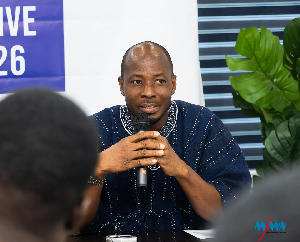Ghana?s Minister for Education, Professor Christopher Ameyaw Akumfi has debunked the notion that the ongoing restructure program for the Non-Formal Education Division of his ministry is politically motivated.
In an exclusive interview with the author at the Headquarters of the Ministry of Education in Accra last December, the Minister revealed that the restructuring of the Non-Formal Education Division (NFED) of his ministry was a requirement of a proposal developed in 1998, which got approved by the NDC government in 1999. He said, ?implementation did begin before we even came to the scene. So that was there calling for restructuring. The unfortunate thing is that you implement such a thing and people feel that you are doing politics.?
Professor Ameyaw Akumfi added that it was obvious the restructuring exercise was going to affect personnel at the NFED. However, when you agree on long term package with some development agency such as the World Bank you have to do what is required in the agreement. ?So we have to restructure otherwise they are going to ask questions. Questions about the loan given. We have been quite slow with the restructuring but now we have had consultants on the ground who reviewed the program and their report is now ready?, said the Minister. Asked why the need for the restructure, the Minister explained that the government attaches great importance to functional literacy as one of the keys to national development. He referred to functional literacy as an international goal to achieve education for all. And mentioned that Ghana is one of the 18 countries slated for fast track functional literacy in the ?education for all.? The goal is to get at least 50% of our illiterate population to be able to read and write by the year 2015. About 65% of Ghana?s population can?t read and write any language. So the NFED must be efficiently structured to be able to meet such goal. Its program and personnel must therefore be brought to acceptable standards and that is what the restructuring is all about.
The Honorable Minister contended, ?when you are dealing school dropouts and those who have never been to school you realize that you are dealing with two main issues, which are literacy/numeracy and skills acquisition.? The NPP government, the Minister stressed, is of the opinion that there should be a marriage between literacy/numeracy and skills acquisition for learners (especially the younger ones) of the non-formal education program. Hence, competent personnel must be recruited for the NFED. To this wise, positions in the NFED were advertised nation-wide and interviews were being conducted to fill those positions as at the time the researcher spoke with the Minister.
Professor Ameyaw Akumfi revealed his government?s intention to move away from the tendency of getting trained teachers from the classroom to work at the NFED. Instead, they prefer recruiting retired teachers and re-training them for the functional literacy program.
There are about 8,000 literacy classes throughout Ghana, which required competent facilitators and knowledgeable supervisors and directors right from the district level to the national level.
Every year about 200,000 learners are recruited by the NFED to go through basic literacy and acquisition of occupational and developmental skills. These learners are handled by 8,000 facilitators who are volunteers within their respective communities. Thus, there is a ratio of 1 facilitator to 25 learners. Classes are held for 6 hours in a week.
The NFED has a national headquarters in Accra, 10 regional offices, 110 district offices and 1,200 zonal centers. The management of NFED falls directly under the Minister for Education. The Division is however headed by an Executive Director, who controls three directorates of the program, namely, Finance and Administration, Field Operations, and Material Development. Among the major achievements of the national functional literacy program run by the NFED so far is the reduction of the national illiteracy rate from 69% in 1985 to 53% in 1995. This significant landmark could be attributed to the successful implementation of phase one of the program (1992 ? 1997) during which 1.2 million learners graduated as new literates. It reduced the national illiterate adult population of 5.6 million (1984) to 4.4 million.
It is on record that Ghana?s functional literacy program is very unique and it is hoped that the restructuring of the NFED would be genuine, comprehensive, cost-effective and devoid of partisan politics to enhance our efforts to achieve education for all by the year 2015 as targeted.
Dept. of Curriculum, Teaching and Learning (CTL)
The Ontario Institute of Studies in Education
University of Toronto

Views expressed by the author(s) do not necessarily reflect those of Ghanaweb.














